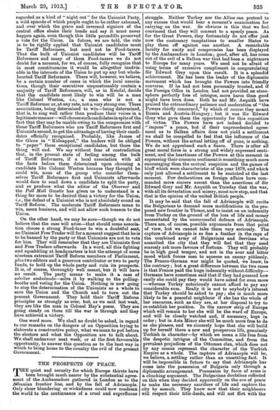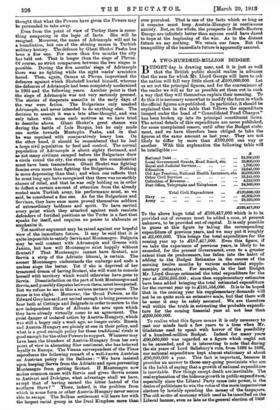THE PROSPECTS OF PEACE. T HE quiet and security for which
Europe thirsts have been brought much nearer by the substantial agree- ment of the Ambassadors gathered in London as to the hibanian frontier line, and by the fall of Adrianople. Only sheer blundering or wickedness could now condemn the world to the continuance of a cruel and superfluous struggle. Neither Turkey nor the Allies can pretend to any excuse that would bear a moment's examination for carrying on the war. So obvious is this that we feel convinced that they will consent to a speedy peace. As for the Great Powers, they fortunately do not offer just now the customary temptations to smaller States to play them off against one another. A remarkable faculty for amity and compromise has been displayed by the Ambassadors in London ; good, after all, has come out of the evil of a Balkan war that had been a nightmare to Europe for many years. We need not be afraid of using terms of excessive compliment in congratulating Sir Edward Grey upon this result. It is a splendid achievement. He has been the leader of the diplomatic movement which has brought the Powers into friendly converse. If he had not been personally trusted, and if the Foreign Office in London had not provided an atmo- sphere perfectly free of intrigue, more harm than good might have been done. Both he and Mr. Asquith have praised the extraordinary patience and moderation of "the Powers chiefly concerned," by which of course they meant Russia and Austria-Hungary ; but it was Sir Edward Grey who gave them the opportunity for this exposition of virtue. The Powers have not indeed decided to " impose " a peace, but if their unprecedented agree- ment as to Balkan affairs does not yield a settlement we shall be compelled to feel that the influence of the Powers, without the actual letting off of guns, is nothing. We do not apprehend such a fiasco. There is after all great moral force in a strong and widely expressed senti- ment, and the heartiness of the Powers at this moment in expressing their common sentiment is something much more encouraging than the mutual suspicion and the games of bluff which were characteristic of the year 1878, and which only just allowed a settlement to be snatched at the last moment. Few declarations on foreign affairs have com- manded more sincere assent than the assertions of Sir Edward Grey and Mr. Asquith on Tuesday that the war, with all its devastation and misery, must now stop, and that that is the opinion of the united British people.
It may be said that the fall of Adrianople will excite the Bulgarians to demand more modifications in the pro-. posed new frontier in Thrace, and to insist on an indemnity from Turkey on the ground of the loss of life and money necessitated by the unsuccessful defence of Adrianople. There are, of course, possible arguments from that point of view, but we cannot take them very seriously. The capture of Adrianople is so fine a feather in the caps of the combined army of Bulgarians and Servians who assaulted the city that they will feel that they need scarcely ask more favours of fortune. They will probably be in high good temper, and not in the sour and bitter mood which forces men to squeeze an enemy pitilessly. The Franco-German war might be quoted, we know, to the contrary ; but a great difference between the two cases is that France paid the huge indemnity without diffibulty- Germans have sometimes said that if they had guessed how easily she could pay they would have asked for even more —whereas Turkey notoriously cannot afford to pay any considerable sum. Really it is not to anybody's interest that Turkey should be asked to pay; she is much more likely to be a peaceful neighbour if she has the whole of her resources, such as they are, at her disposal to try to re-establish her position. In the narrow strip of Europe which will remain to her she will be the ward of Europe, and will be closely watched and, if necessary, kept in order ; but in Asia Minor she will be much more free to do as she pleases, and we sincerely hope that she will build up for herself there a new and prosperous life, genuinely Turkish in character—by which we mean a life free from the despotic intrigue of the Committee, and from the prevalent prejudices of the Ottoman clan, which does not by any means represent the character of the Turkish Empire as a whole. The capture of Adrianople will be, we believe, a settling rather than an unsettling fact. It will be impossible in future to say that Adrianople has come into the possession of Bulgaria only through a diplomatic arrangement. Possession by force of arms is a clinching argument. The Bulgarians doubtless reflected on this when they decided apparently on the eve of peace to make the necessary sacrifices of life and capture the city by assault. They know now that their neighbours will respect their title-deeds, and will not flirt with the
thought that what the Powers have given the Powers may be persuaded to take away.
Even from the point of view of Turkey there is some- thing composing in the logic of facts. She will be resigned. Moreover, the name of Adrianople will not be a humiliation, but one of the shining names in Turkish military history. The defence by Ghazi Shukri Pasha has been a fine one. For more than live months the city has held out. That is longer than the siege of Plevna. Of course, no strict comparison between the two sieges is possible. During the five months' siege of Adrianople there was no fighting while the eight weeks' armistice lasted. Then, again, Osina.n at Plevna improvised the defences against which Skobeleff hurled himself, whereas the defences of Adrianople had been completely modernized in 1905 and the following years. Another point is that the siege of Adrianople was not very seriously pressed. The stories of desperate assaults in the early days of the war were fiction. The Bulgarians only masked Adrianople, and never intended to do anything else. The decision to assault it was a late after-thought, and was only taken with some such motives as we have tried to describe above. Ghazi Shukri's great chance was during the battle of Lule Burgas, but he only made one sortie towards Mustapha. Pasha, and in that he was repulsed with comparatively heavy loss. On the other hand, it should be remembered that he had a large civil population to feed and control. The normal population of Adrianople is about eighty thousand, and as not many civilians escaped before the Bulgarians drew a circle round the city, the strain upon the commissariat must have been tremendous. Ghazi Shukri was fighting famine even more than fighting the Bulgarians. Nothing is more depressing than that ; and when one reflects that he must long ago have recognized that there was no earthly chance of relief, and that he was only holding on in order to deflect a certain amount of attention from the already routed main Turkish army, his performance must, as we said, be considered a fine one. As for the Bulgarians and Servians, they have once more proved themselves soldiers of extraordinary boldness and spirit. To have carried every point which they attacked against such resolute defenders of fortified positions as the Turks is a fact that speaks for itself, and requires no praise to elaborate or emphasize it.
Yet another argument may be raised against our hopeful view of the immediate future. It may be said that it is quite impossible to satisfy Servia and Montenegro. Bulgaria may be well content with Adrianople and Greece with Janina, but how will Montenegro exist happily without Scutari? That Montenegro cannot have Scutari, nor Servia a strip of the Adriatic littoral, is certain. The sooner Montenegro understands the embargo and ends a useless siege the better. Yet if she is deprived of her treasured dream of having Scutari, she will want to console herself with territory which would otherwise have gone to Servia. Dissatisfaction on the part of both Montenegro and Servia, and possibly disputes between them, must beexpected. But we refuse to see in this a serious menace to peace. The cause is too slight. Moreover, the Great Powers, as Sir Edward Grey has said, a re united enough to bring pressure to bear both at Cettinje and Belgrade in order to secure to the new independent State of Albania the area upon which they have already virtually come to an agreement. The great danger of isolated action by Austria-Hungary, which was still a bogey only a week ago, no longer exists. Russia and Austria-Hungary are plainly at one in their policy, and what is a good enough policy for these traditional rivals is good enough for the other Powers to support. Whatever may have been the blunders of Austria-Hungary from her own point of view in alienating Slav sentiment, she has behaved loyally to Europe. The Vienna correspondent of the Times reproduces the following remark of a well-known Austrian on Austrian policy in the Balkans : "We have insisted upon keeping Servia from the Adriatic and upon preventing Montenegro from getting Scutari. If Montenegro now makes common cause with Servia and gives Servia access to Antivari and Dulcigno, what advantage shall we have, except that of having earned the bitter hatred of the southern Slays ? " There, indeed, is the problem from which in some form or other Austria-Hungary never seems able to escape. The Balkan settlement will leave her with the largest racial group in the Dual Kingdom more than
ever provoked. That is one of the facts which so long as it remains must keep Austria-Hungary in continuous anxiety. But, on the whole, the prospects in South-Eastern Europe are infinitely better than anyone could have dared to hope at the beginning of the war. As to the distant future we say nothing. We retain our fears. But the tranquillity of the immediate future is apparently assured.











































 Previous page
Previous page